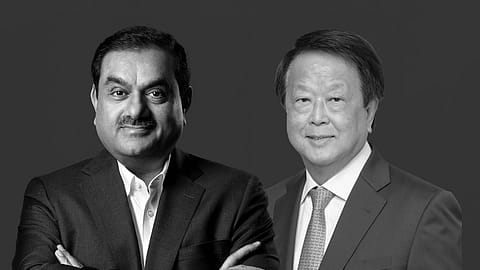How Gautam Adani’s ingenuity, Kuok Khoon Hong’s foresight created an FMCG powerhouse
The rise of Adani Wilmar was shaped by a chance meeting and bold decisions.

While the New Year will mark the formal separation of the Adani group’s first foreign joint venture with Wilmar International, it’s fascinating to know how it all began 25 years ago.
In a candid conversation with Fortune India, Kuok Khoon Hong, Chairman and CEO of Wilmar International, reflects on the partnership that started it all. “To succeed in any new market, especially one as big and complex as India, you need technical expertise, local knowledge, and the ability to build a solid local team. Adani’s contribution was invaluable,” says Kuok.
The story of how Gautam Adani and Kuok Khoon Hong of Wilmar International came together is a tale brimming with vision, serendipity, and mutual respect—one that’s worthy of retelling.
The Unlikely Meeting
The seeds of this partnership were sown at a time when Gautam Adani was transforming a barren stretch of land alongside India’s western coast into the bustling Mundra Port. The port’s strategic location and its potential to drive port-based agri-refineries were becoming evident.
Atul Chaturvedi, the then head of Adani’s agro-business, played a pivotal role in orchestrating the initial meetings. In an interaction with the writer back in 2015, Chaturvedi revealed that while scouting potential partners, he arranged for Adani to visit Sime Darby Plantation’s edible oils facility in Singapore. Though impressed by the plant, fate had another card to play. A commodity broker accompanying Adani suggested a quick visit to Wilmar International’s facility, as Adani had a couple of hours before his flight.
At Wilmar, Kuok was preoccupied with a meeting involving bankers and directed an employee to attend to Adani. Before leaving, Adani handed over a single-page brochure detailing the upcoming Mundra Port. That piece of paper would soon ignite Kuok’s curiosity. Seeing the port’s potential to cater to India’s populous northern belt, Kuok decided to meet Adani personally. Over dinner, Kuok expressed his interest in visiting the port—a meeting that would mark the beginning of a transformative joint venture.
Recommended Stories
Adani, in an interaction with Fortune India in 2022, had mentioned that the clincher for Wilmar was the port facility. "Then (27 years ago), we were the largest importers of edible oil. Wilmar approached us when we were developing the Mundra port. They had the vision of port-based agri-refineries," said Adani.
Vision meets ingenuity
The negotiations for the joint venture weren’t without their moments of tension as Chaturvedi had revealed in 2015. Wilmar initially proposed a 1,000-tonne-per-day refinery, a figure that seemed outrageous at the time. Chaturvedi, the only one in the boardroom with extensive knowledge of the oil industry, whispered to Adani, “Yeh Cheeni pagal hai [This Chinese guy is out of his mind].”
The largest refinery in India back then was just 220 tonnes per day. Chaturvedi thought he had the upper hand in the discussion, but Adani’s wisdom prevailed. He urged the team to understand Kuok’s perspective. They eventually settled on a 600-tonne-per-day refinery. Today, that same facility operates at an impressive 5,000 tonnes per day, underscoring Adani’s ability to foresee opportunities and scale like few others.
(INR CR)
“Gautambhai could see the writing on the wall,” Chaturvedi later recalled. Back in 1999, India consumed 7 million tonnes of edible oil annually. Today, that figure has skyrocketed to 24-25 million tonnes, with no signs of slowing down.
“What’s so special about your boss?” Kuok once asked Chaturvedi.
“He’s a quick decision-maker, and I believe you share that trait,” Chaturvedi replied.
Teasing Kuok a little, Chaturvedi asked, “What do you find interesting about him?”
“Your boss has a round Buddha face. Such men are trustworthy. He has that Buddha smile,” replied Kuok.
The words proved to be prophetic as the partnership thrived in an era where long-lasting business collaborations are increasingly rare. “Adani Wilmar remains the only Wilmar joint venture managed entirely by local talent, with not a single expatriate posted there since its inception,” Kuok tells Fortune India.
From its humble beginnings to becoming a prominent market player, the JV is a testament to what can happen when two like-minded leaders come together.